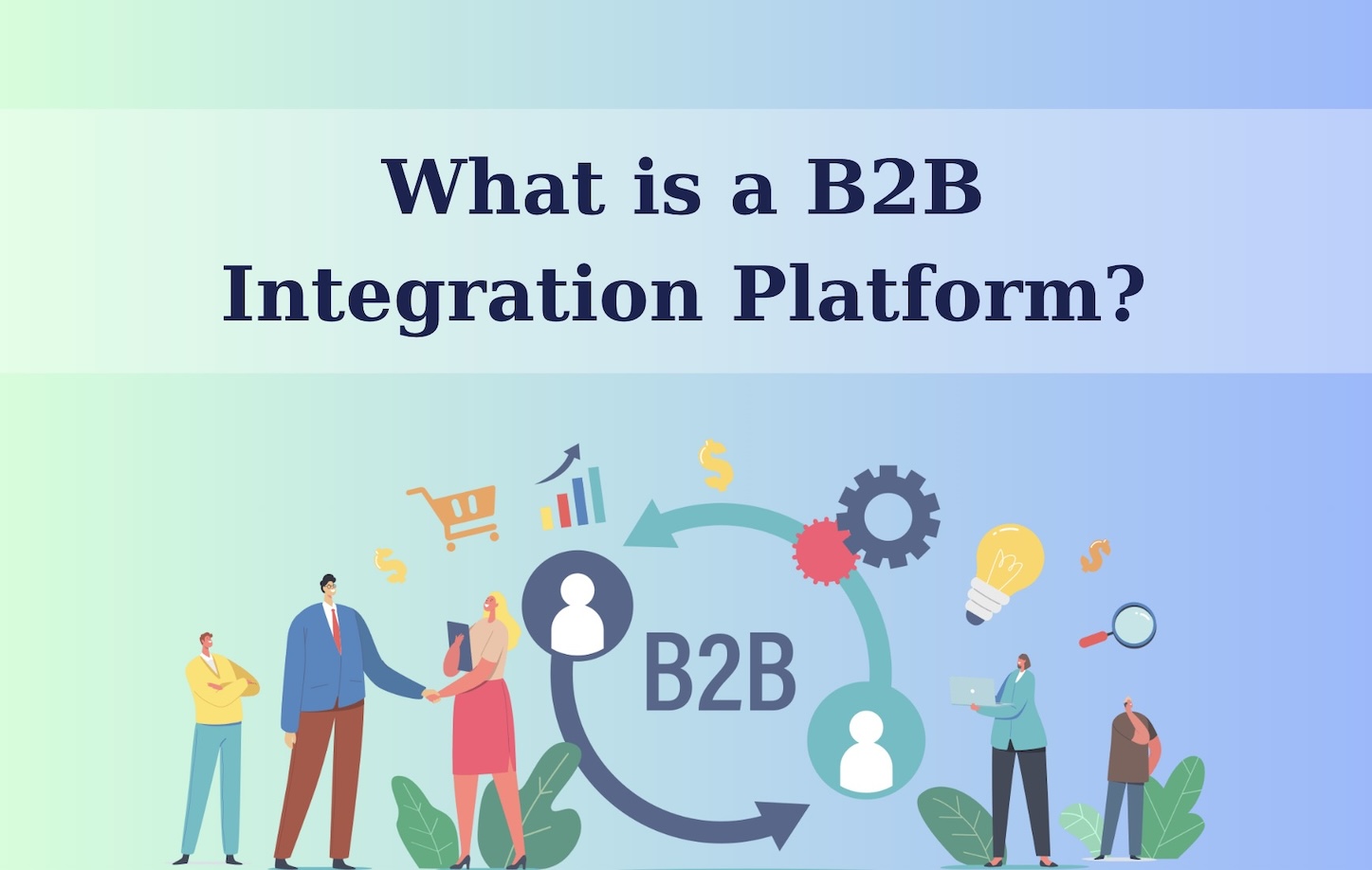Seamless communication and collaboration with partners, suppliers and customers is what makes businesses live and die. So how does a company get to this level of connectivity? The answer is a B2B integration platform. It is like a digital bridge between the businesses to exchange data without any hassle and work smoothly.
Curious to learn more? In this article, we’re going to take a look at the world of B2B integration platforms, what they are, how they work, and why they’re important for modern enterprises.
Contents
What is B2B Integration?
B2B integration is defined as the process of linking two or more business systems and applications to automatically share and exchange data between companies. This enables businesses to reduce their operations, reduce errors and improve their efficiency.
B2B integration provides the following key capabilities: tracking and reporting on workflows, translating data in and out of different formats, visualizing relationships with systems and data. Different ways in which businesses can test integration to ensure that it will work as well as planned. Furthermore, companies can make and manage integrations with many B2B integration tools like IBM Sterling, Microsoft Biztalk, and SAP Business Technology Platform.
B2B integration, in general, is a great way for businesses to automate their processes, the accuracy of their data and overall clarity in their operations and partnerships.
What is a B2B Integration Platform?

A B2B integration platform is software that connects and shares information between your business and your partners, suppliers, and customers. It is a central hub that acts as a link through which companies exchange data, and automate workflows.
These platforms give businesses a means to send documents, transactions or other data quickly and securely without having to rely on each other’s hustles like emails and spreadsheets. The key features include connecting different software systems, translating data formats, supporting different communication protocols, automating processes, real-time visibility and scalability.
Using a B2B integration platform enables organizations to increase efficiency, make better decisions faster, and provide better customer experiences by working more efficiently with their partners.
How Does a B2B Integration Platform Work?
B2B integration platforms are powerful tools that make it easy for businesses to connect and work together. They make data sharing easier, processes smoother and make overall enhanced efficiency easier. Let’s walk through how these platforms work step by step:
Step-by-Step Process
1. Data Collection

The first is that the platform takes data from different business systems it uses, for instance, ERP (Enterprise Resource Planning), CRM (Customer Relationship Management), or supply chain visibility. It’s like the platform is just pulling everything together, all the important pieces of information. This is important so nothing gets missed and you are ready for whatever comes.
2. Data Transformation
Then the collected data is processed so that it can be used easily by other systems. Each format is different XML, JSON, CSV files and different tools use different formats. All this is then converted into a format that everyone understands. (For all the systems to know how to speak to each other without confusion or compatibility problems).
3. Data Transmission
The platform is safe when the data is ready, it sends it where it should go. Whichever the recipient requires, it chooses the best way to do this, whether it’s using FTP, AS2, or APIs. Along the way it also protects sensitive information by applying security measures like encryption.
4. Target Application
Finally, the data finally gets where it’s supposed to be and it’s placed where it’s supposed to go. Let’s say update a database, trigger an order, and begin a payment process. The whole setup is on the platform and everything fits perfectly into the recipient’s system and they can get to use the information immediately without having to do any extra work.
Read more: How To Set Up B2B And Wholesale Stores On Shopify In A Effective Way
Technologies involved
B2B integration platforms use several important technologies to make everything work together. Let’s take a look at the key ones:
1. EDI (Electronic Data Interchange)

One of the oldest and most reliable methods for exchanging business data is EDI (Electronic Data Interchange). The documents like purchase orders and invoices get standardized in format which makes them easier for systems to read and process automatically. EDI is still used as a foundation for many B2B integration tools in many industries.
2. APIs (Application Programming Interfaces)

In real-time, APIs let different software applications communicate with each other. With complex data exchanges, they are very flexible and are a popular choice for modern B2B integrations. The APIs let businesses connect their systems quickly, and easily adapt to changing needs.
3. Middleware Technologies
Middleware is the bridge that joins together systems and makes them cooperate silently. It is a responsibility of handling the task of data transformation, routing, and error management. But middleware makes it possible to integrate systems that were not originally designed to work together.
4. Cloud and On-Premises Integration
Most of these B2B integration platforms are now running in the cloud, which means they are scalable and flexible. Cloud solutions allow businesses to connect without having to put in heavy infrastructure. However, businesses tend to use on-premises solutions for tight control over their data or they must comply with specific security requirements.
B2B integration platforms bring together these technologies to offer the necessary tools for businesses to exchange data smoothly and securely. The combination of traditional and modern methods allows for the use of a large variety of systems and use cases.
You need wholesale solutions: pricing, registration forms, tax exempt, order minimums and more BSS: B2B & Wholesale Solution.
Benefits of Using a B2B Integration Platform
B2B integration platforms can bring many benefits to businesses. Let’s take a closer look at some of the key advantages:
- Enhanced Efficiency: A B2B integration platform automates data exchange and eliminates manual, error-prone processes to dramatically speed and accuracy in the exchange of business transactions. It does all the heavy lifting for you and no more rekeying information, no more chasing down missing data.
- Improve Collaboration: It is a centralized hub where you can share documents and communicate with your organization and your partners without any hassle. This improved connectivity allows for stronger, more productive partner relationships with suppliers, customers and other key stakeholders.
- Cost Savings: Automating routine tasks like order processing, invoicing, handling inventory, etc. allows companies to save a lot of money and do so quickly and easily. But on top of that, the platform makes it easy to quickly onboard new partners, meaning you can grow your network without the additional administrative work.
- Improved Visibility and Control: B2B integration platforms provide real-time updates of the status of the orders, shipments and other mission-critical data. This gives you a greater visibility of your supply chain which allows you to quickly identify and resolve any potential problems so your supply chain keeps running smoothly.
- Better Decision-Making: A consolidated view of your business relationships, integration monitoring and analytics will help you make more strategic decisions.
In general, a B2B integration platform is the connective tissue between your organization and its partners. Streamlined data exchange and automated key processes can help you run more efficiently, work more effectively and achieve better business results. It’s a true game changer for companies trying to survive in today’s fast-paced, connected marketplace.
You are finding a wholesale B2B app with quick orders, bulk orders, net terms, quotes & sales rep, try B: Wholesale Customer Accounts now!
You may concern: Etsy Shopify Integration: The Ultimate Guide
B2B Integration Examples
Retail
Retailers who need to keep shelves stocked and customers happy rely on B2B integration services. Walmart, for instance, will automate inventory replenishment with suppliers using Electronic Data Interchange (EDI). The integration enables the retailer to smoothly manage stock and communicate in real-time with its very big supplier network. For instance, Amazon partners with third parties to manage product listings, pricing, and logistics, and that’s how customers get one continuous shopping experience.
CRM – Customer relationship management

In CRM, it is all about systems integration, the ability to allow businesses to provide a personalized customer experience. For example, Salesforce can sync customer data, purchase history, and support tickets across Salesforce to external platforms: Shopify or SAP. This allows companies to see a unified view of each customer, and run targeted marketing campaigns or improve support services.
Logistics
B2B integration is used by logistics companies to manage complex supply chains. DHL works with e-commerce platforms like WooCommerce or Magento to automate the process of shipping labels, tracking delivery in real-time, and even keeping customers up to date. Just as FedEx has API-centric integration for businesses to integrate shipping, billing, and order management processes.
Related topic: WordPress Shopify Integration: How to Perform with 6 Easy Steps
Distribution
B2B integration is used to connect distributors to manufacturers and retailers. Take Coca-Cola as an example: It integrates directly with retailers’ point-of-sale systems to predict stock levels and automate restocking orders and its distribution network. This real-time collaboration means less downtime and products are kept on the shelves of the stores.
Cloud Integration

Cloud integration is the fundamental B2B connectivity today. Let’s take Slack and Microsoft Teams as an example: companies can integrate their services with third-party tools such as Dropbox, Google Workspace or Salesforce to share data, work together efficiently. Another example is HubSpot, which integrates with all sorts of marketing, sales and accounting tools and keeps the data flowing in the same way.
Which B2B Integration Solution is Best for My Business?
When it comes to choosing the right B2B integration solution for your business, there is a lot to choose from. But don’t worry, we’ve got you covered with the key factors you should consider to find the perfect fit:
The first thing you need to do is to consider your particular integration needs. How do you connect these types of data and systems? Are you working with mostly on-premises applications, cloud-based integration or hybrid and multi-cloud environments? Knowing what you really need will allow you to eliminate some of the possible solutions.
Next, let’s see what a b2b integration platform can do. Will it be able to read the data formats, communications protocols and API styles that you depend on? You don’t want a solution that can’t fit into your current tech stack without a hitch.
As far as tech stacks are concerned, think about how well the integration platform will mesh with your other business systems. The more it can plug into your CRM, ERP, e-commerce platforms and the like, the more value you’ll get out of the investment.
Another critical factor is ease of use, but especially so if you have a lean IT team. Find solutions with intuitive, user-friendly interfaces that allow you to set up connections, automate workflow, and track performance.
Don’t forget security and compliance. Sensitive data moves back and forth between your organization and partners, and you require ironclad safeguards and the ability to comply with industry regulations. Only select platforms that have strong secure features and a history of working.
Finally, think about scalability. The solution you choose will need to evolve with your business, because you can’t predict how your business needs will change. One, look for flexible pricing, two, look for the ability to onboard new partners quickly and three, look for a roadmap of future capabilities.
When you consider all of these factors, you can identify a B2B integration platform that meets all the criteria — one that connects your systems smoothly, helps you streamline your operations and enhances your partnerships.
Get B2B Integration Solutions with BSS Commerce

BSS Commerce is your partner when it comes to unlocking the full potential of your B2B ecommerce operations.
With deep expertise across Magento, Shopify and BigCommerce, BSS Commerce is a global full-service agency that can build custom B2B solutions specific to your needs.
When it comes to unlocking the full potential of your B2B ecommerce operations, BSS Commerce is the partner you want in your corner. A perfect proof of their ability to deliver – their impressive portfolio of over 1,468 successful ecommerce projects.
But it’s not just their technical chops that set BSS Commerce apart. The team is renowned for their exceptional customer service, with a 90% loyal client rate and 5-star reviews across industry-leading platforms. They take a truly consultative approach, working closely with you to understand your pain points and craft seamless, end-to-end solutions that integrate your B2B platform with your CRM, ERP, and other critical business systems.
Whether you’re launching a new B2B ecommerce presence or enhancing one you already have, BSS Commerce has the expertise and resources to get it done. Everything from designing robust customer portals and consolidated logged in pricing to making sure your platform is running at its best can be handled by their specialists. This is a true one-stop shop for enterprises looking to simplify their B2B operations and grow.
If you’re ready to take your B2B ecommerce to the next level, then look no further than BSS Commerce, the global experts. You can trust that they will deliver the tailored, high-impact solutions your business needs to thrive and that they do so with their customer-centric approach and proven track record.
Sum Up
The key to major efficiencies and cost savings for your business is a B2B integration platform. With these powerful tools, you seamlessly connect your systems and automate critical workflows, changing the way you operate.
With no more manual data entry, better collaboration with partners, and increased visibility — it all translates to happier customers, stronger profits, and fewer headaches. The opportunities are limitless, but choosing the right B2B integration solution takes some thought.
It’s time to discover the integration revolution that can transform your B2B operations. If you have the right strategy, you can work out processes, build relationships, and put your business in a place for long-term success.




